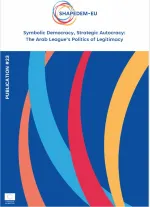Symbolic Democracy, Strategic Autocracy: The Arab League’s Politics of Legitimacy

This case study examines the role of the League of Arab States (LAS) in the EU Southern Neighbourhood, particularly in the realms of democracy and autocracy support. While the LAS has developed instruments and discourses aligned with democratic principles – such as election observation, human rights charters, and governance reforms – its actions often reflect symbolic gestures rather than substantive commitments. The 2011 Arab uprisings serve as a pivotal moment to assess the League’s dual approach: proactive and interventionist in Libya and Syria under the guise of humanitarianism and democracy, yet passive or complicit in Bahrain and Yemen, aligning with Gulf Cooperation Council (GCC) interests to suppress democratic movements. The study argues that the LAS’s engagement is shaped less by normative commitments to democracy and more by the strategic interests of dominant member states, particularly GCC monarchies. Ultimately, the League’s actions reveal a pattern of authoritarian collaboration masked by pro-democracy rhetoric, aimed at regime survival and regional stability rather than genuine democratic transformation.